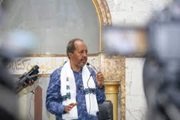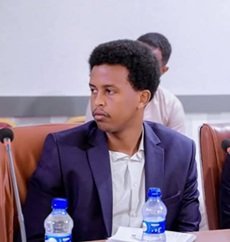By Mohamed A Yasin
“When elephants fight, it is the grass that suffers.”
This African proverb poignantly captures the essence of Somalia’s political turmoil, where the power struggles and conflicts among leaders disproportionately harm the ordinary people. Under President Hassan Sheikh Mohamud, the country’s political landscape has become a battleground of personal agendas, leaving the Somali populace to bear the consequences.
The 1P1V Initiative: A Flawed Push for Democracy

President Hassan Sheikh Mohamud’s push for a one-person, one-vote (1P1V) electoral system, initially celebrated as a forward-thinking step toward democracy, has instead exacerbated political unrest and social division in Somalia. The proposal has faced widespread rejection from opposition parties, federal member states, and the broader population, all of whom view the initiative as an imposition on the country’s fragile federal system.
The reason behind the widespread panic among Somalis lies in the alarming state of the nation’s governance. At this critical juncture, Somalia lacks an independent and functioning judiciary, an effective legislative body, or a capable prime minister. To compound matters, only Puntland Federal Member State (FMS) currently has the stability and security required to accommodate a one-person, one-vote (1P1V) electoral system.
Key federal member states, Jubaland and Puntland, have outright rejected the president’s 1P1V plan. Their objections are rooted in the lack of consultation with the various stakeholders who form the backbone of Somalia’s federal system. Both Jubaland and Puntland have emphasized the importance of inclusive decision-making and warned that such unilateral actions will deepen existing divisions within the country.
The situation has been further aggravated by last year’s amendments to four critical chapters of the Provisional Federal Constitution (PFC), which were implemented without consultation. These amendments have sparked outrage among opposition parties and federal member states, who view them as an overreach of presidential power and a threat to Somalia’s already fragile political framework. The president’s disregard for constitutional protocols has fueled fears of centralized authoritarianism, leading to a growing mistrust of the federal government.
The Decree for Disarmament: A Dangerous Escalation
President Hassan’s recent decree mandating the forced disarmament of opposition figures has added fuel to the fire Former Somali President criticizes government over Constitution, elections, and security . Ostensibly aimed at bolstering national security, this decree is seen by critics as a poorly timed and reckless move. With the Al-Shabaab insurgency still a potent threat—encircling Mogadishu and controlling significant rural territories—the priority should be on strengthening the country’s defenses, not suppressing political dissent.
The president, prime minister, and parliamentary speaker are currently under the protection of AMISOM forces—an alarming reflection of Somalia’s fragile security environment. The decision to disarm opposition figures, combined with the unresolved political impasse, has heightened fears of violent conflict erupting in Mogadishu. The capital is at risk of descending into chaos, which could trigger a broader conflict with no clear resolution in sight.
Allegations of Corruption and Nepotism: The Price of Power
Unlike previous presidents such as Abdullahi Yusuf, Sheikh Sharif Ahmed, and Mohamed Abdullahi Farmajo, none of whom were implicated in corruption, President Hassan Sheikh Mohamud stands alone as the only leader in recent history to face accusations of corruption during both of his terms. Before ascending to the presidency, Hassan was a modest university professor, struggling to make ends meet and relying on his wives, who worked as traders to support their family. However, upon assuming office, President Hassan has transformed into one of Somalia’s wealthiest figures, raising suspicions about the source of his newfound wealth.
Reports have surfaced suggesting that international anti-money laundering organizations, including the Financial Action Task Force (FATF), the Egmont Group of Financial Intelligence Units, and entities like the World Bank and IMF, are now monitoring President Hassan’s financial activities. There are even indications that efforts may be underway to freeze his assets, along with those of his alleged accomplices.
The attrition of public trust in President Hassan’s leadership has been further exacerbated by mounting allegations of corruption and nepotism to an extend that food aid is politized Puntland rejects federal food aid intended for drought and conflict-affected communities. Reports indicate that the president’s administration has been involved in the sale of public lands—including military barracks—diverting the proceeds into private accounts controlled by the president and his inner circle. This practice has displaced nearly 600,000 people, including families of Somali National Army (SNA) personnel, adding yet another layer to the nation’s already dire humanitarian crisis.

Moreover, government contracts have reportedly been monopolized by companies linked to the president, and key appointments within the government have often gone to his relatives and Political allies – see today’s despicable appointment of 22-year-old with no government experience to the Director of the Legal Department of the Ministry of Foreign Affairs of Somalia. The son’s only qualification is that his father is the state Minister of the Presidency of the FGS Wiil yar uu dhalay WASIIR oo xil sare looga magacaabay DF Somalia | Caasimada Online .This cronyism undermines Somalia’s fragile institutions and fuels a perception of betrayal among those who once supported him. Even some members of the president’s own political party and former allies in the opposition have distanced themselves from him, further revealing the deep fractures within Somalia’s political landscape.
Health Concerns and Questionable Decisions
Critics have raised concerns about President Hassan’s mental, pointing to a pattern of erratic decision-making. For instance, the president’s controversial decision to permit the importation of the narcotic substance khat from Kenya—allegedly a source of personal profit—has sparked widespread condemnation. Similarly, a directive granting a monopoly on livestock exports to a Yemeni-Saudi businessman has ignited protests from opposition leaders and members of parliament From Reform to Controversy: President Hassan Sheikh Mohamud’s second term – WardheerNews
Such decisions suggest a disconnect from the reality on the ground, and they reflect a president who seems increasingly out of touch with the needs and struggles of the Somali people. This sense of detachment from the hardships faced by ordinary citizens has further alienated the public, creating a perception of a leader who is insulated from the daily challenges of governance.
Federal Member States Under Siege
Jubaland Federal Member State (FMS) is under significant pressure from Somali National Army (SNA) forces advancing from the south and west, focusing on strategic locations such as Raskambodi and Dollow. Adding to the strain, the Federal Government of Somalia (FGS) has redirected civilian flights from Nairobi, bypassing Kismayo, which has disrupted the region’s logistical and economic stability. Compounding these challenges, President Hassan Sheikh Mohamud has withheld critical development funds and budgetary support, a decision widely interpreted as an effort to pressure the Jubaland administration into submission.
President Ahmed Islam Madobe of Jubaland arrived in Kenya yesterday in route to the United Arab Emirates for medical treatment. His travel defied the Federal Government of Somalia’s politically motivated ban on international flights to Jubaland, a measure imposed over political disputes. President Ahmed Mohamed Islam’s Election Campaign: A Test of Federalism in Somalia – WardheerNews
The ban has severely impacted residents of Jubaland, many of whom cannot afford the added costs of first traveling to Mogadishu for verification before seeking medical care abroad. This policy has been widely criticized as an unacceptable politicization of civil aviation, violating regulations set by the International Civil Aviation Organization (ICAO).
In the meantime, Puntland FMS is engaged in an intensive campaign to eliminate the Somali branch of ISIS (Daish). To date, the Puntland army has reclaimed approximately 14 strategic bases and successfully neutralized nearly five explosive-laden drones. Despite these significant achievements, President Hassan has failed to acknowledge the campaign or offer congratulations. Instead of providing much-needed armaments and financial support to Puntland, the president has chosen to withhold their development budget, further deepening divisions within Somalia’s federal system.
If President Hassan Sheikh Mohamud proceeds with his unilateral 1P1V initiative despite widespread opposition, the political ramifications could be catastrophic for Somalia’s already fragile federal structure. Former President Sheikh Sharif Sheikh Ahmed’s statement regarding Puntland’s potential declaration of independence underlines the gravity of the situation. Implications of Somalia’s Current Turmoil on Puntland – WardheerNews
Sheikh Sharif’s warning is a blunt reminder of the delicate balance Somalia must maintain to preserve its unity. A cooperative approach that respects the federal structure and addresses the grievances of all stakeholders is the only viable path to national stability. Failure to heed this warning could lead to irreparable damage to Somalia’s sovereignty and territorial integrity.
The remaining federal member states—Hirshabelle, South West State, and Galmudug—are equally beleaguered, with Al-Shabaab tightening its grip on their territories. These states are struggling to maintain control within their borders, with many facing power vacuums as the mandates of their presidents have expired. This instability leaves these regions vulnerable to both internal strife and external threats, further complicating the country’s already fragile political landscape.
Hirshabelle, in particular, is on the brink of collapse, beset by tribal conflicts and encroaching Al-Shabaab forces. The instability in these states highlights the urgent need for reforms within Somalia’s federal system, which is currently unable to function effectively due to the lack of proper governance and coordination.
A Warning from History: Lessons from Other Nations
Somalia’s current predicament mirrors the struggles of other nations where political missteps and corruption have resulted in prolonged instability. The experiences of South Sudan, Libya, and Zimbabwe serve as cautionary tales of the devastating consequences that can follow when power is concentrated in the hands of a few, and when governance is marked by corruption and exclusion.
- South Sudan: The lack of inclusive governance and the concentration of power within a single group led to civil war and ongoing instability.
- Libya: The unchecked ambitions of competing factions, fueled by international interference, have left the country in a perpetual state of conflict, with no clear path to reconciliation.
- Zimbabwe: Authoritarian rule, corruption, and economic mismanagement have brought the country to the brink of collapse.
These cases serve as stark reminders of the dangers of ignoring national unity in favor of personal or political agendas. Somalia faces the real possibility of following a similar path if corrective measures are not taken immediately.
The Path Forward: Dialogue and Compromise
Somalia stands at a crossroads. The choices made by its leaders in the coming weeks will determine whether the nation can chart a path toward stability and democracy, or whether it will descend into further conflict. The lessons of history are clear: only through inclusivity, accountability, and dialogue can Somalia avoid the pitfalls of authoritarianism and fragmentation, and build a future grounded in unity and hope for its people.
To avoid disaster, Somalia’s leaders must prioritize dialogue and compromise. A more inclusive approach that engages all stakeholders—including opposition parties, federal member states, and civil society—is essential for rebuilding trust and fostering national unity.
The international community also has a crucial role to play. Global partners must advocate for an inclusive political process and encourage restraint on all sides to ensure Somalia does not descend further into chaos.
Mohamed A Yasin
Email: moyasin680@gmail.com

Leave a Reply